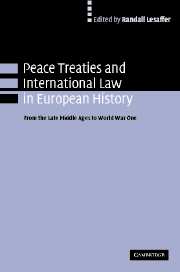Book contents
- Frontmatter
- Contents
- List of contributors
- Acknowledgements
- Table of Treaties
- List of abbreviations
- 1 Introduction
- PART I Peace treaties and international law from Lodi to Versailles (1454–1920)
- PART II Thinking peace: voices from the past
- PART III Thinking peace: towards a better future
- 11 Peace treaties, bonne foi and European civility in the Enlightenment
- 12 Peace, security and international organisations: the German international lawyers and the Hague Conferences
- 13 Consent and caution: Lassa Oppenheim and his reaction to World War I
- 14 Talking peace: social science, peace negotiations and the structure of politics
- PART IV Making peace: aspects of treaty practice
- PART V Conclusion
- Appendix
- Index
12 - Peace, security and international organisations: the German international lawyers and the Hague Conferences
Published online by Cambridge University Press: 07 July 2009
- Frontmatter
- Contents
- List of contributors
- Acknowledgements
- Table of Treaties
- List of abbreviations
- 1 Introduction
- PART I Peace treaties and international law from Lodi to Versailles (1454–1920)
- PART II Thinking peace: voices from the past
- PART III Thinking peace: towards a better future
- 11 Peace treaties, bonne foi and European civility in the Enlightenment
- 12 Peace, security and international organisations: the German international lawyers and the Hague Conferences
- 13 Consent and caution: Lassa Oppenheim and his reaction to World War I
- 14 Talking peace: social science, peace negotiations and the structure of politics
- PART IV Making peace: aspects of treaty practice
- PART V Conclusion
- Appendix
- Index
Summary
Introduction
The centenary celebration of the birthday of Walther Schücking (1875–1935) led Ulrich Scheuner, the distinguished German international lawyer and historian, to declare tersely in 1975: ‘The relationship which Germany has to the establishment of a generally unified state has never had the depth and the character of an idealistic, moralistic movement as it had in other countries, especially in England.’ He primarily based this finding, almost certainly correctly, on Germany's external relationships, including the two World Wars, which resulted in the brief though not particularly favourable era of the League of Nations and the division of Germany after 1945. Within these time frames, with their important international law turning points and events, the international law theory supported neither official German politics nor the idea of achieving peace and security in the international community. It was for this reason that the international lawyer, politician and pacifist Walther Schücking played a particularly important role, not only during his lifetime, but also into the years ofthe construction of the Federal Republic – the role more or less of an outsider.
Where are the inner motivations for these developments? Why indeed did the strongest maritime and colonial power, Britain, develop a stronger notion of securing peace and building international relationships in the age of imperialism, while the young German Empire was devoting itself to glorifying war? The early and publicly effective German peace movement only had a minimal influence on German international law thought.
- Type
- Chapter
- Information
- Peace Treaties and International Law in European HistoryFrom the Late Middle Ages to World War One, pp. 254 - 269Publisher: Cambridge University PressPrint publication year: 2004
- 3
- Cited by



